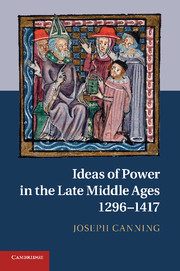Book contents
- Frontmatter
- Contents
- Preface
- Abbreviations
- Introduction
- Chapter 1 Ideas of power and authority during the disputes between Philip IV and Boniface VIII
- Chapter 2 Dante Alighieri: the approach of political philosophy
- Chapter 3 Marsilius of Padua
- Chapter 4 Power and powerlessness in the poverty debates
- Chapter 5 The treatment of power in juristic thought
- Chapter 6 The power crisis during the Great Schism (1378–1417)
- Conclusion
- Bibliography
- Index
Chapter 3 - Marsilius of Padua
Published online by Cambridge University Press: 25 October 2011
- Frontmatter
- Contents
- Preface
- Abbreviations
- Introduction
- Chapter 1 Ideas of power and authority during the disputes between Philip IV and Boniface VIII
- Chapter 2 Dante Alighieri: the approach of political philosophy
- Chapter 3 Marsilius of Padua
- Chapter 4 Power and powerlessness in the poverty debates
- Chapter 5 The treatment of power in juristic thought
- Chapter 6 The power crisis during the Great Schism (1378–1417)
- Conclusion
- Bibliography
- Index
Summary
The intention of this chapter is to consolidate a new interpretation of the political thought of Marsilius of Padua (c.1275/80–1343), by giving priority to his treatment of questions of power and legitimate authority. Marsilius, like Dante, also argued from first principles and was even more driven to write by his experience of contemporary politics. His prime concern was to uncover the sources of strife and to show how peace could be achieved. To this end he sought to demonstrate where legitimate authority lay and (above all) where it did not. These two interrelated questions are the key to unravelling his political thought and address his express reasons for writing.
Marsilius was the product of two intellectual milieux: those of Padua and the University of Paris, where he was rector in 1313. At Padua his professional training was in medicine and at Paris his institutional home was the Faculty of Arts. His main political work, Defensor pacis (Defender of Peace) (completed at Paris on 24 June 1324), was a massive undertaking – the modern critical edition of Richard Scholz, for instance, amounts to 613 pages. But he also wrote two short works: De translatione imperii (On the Translation of the Empire), composed at Paris, 1324–6(?), and the Defensor minor (Lesser Defender), produced at the court of Lewis IV of Bavaria at Munich between 1339 and 1341, together with two short tracts on whether the marriage between Margaret Maultasch, Countess of Tyrol and Carinthia, and the emperor's son would be legal, tracts which were incorporated as the final four chapters of the manuscript of the Defensor minor.
- Type
- Chapter
- Information
- Ideas of Power in the Late Middle Ages, 1296–1417 , pp. 81 - 106Publisher: Cambridge University PressPrint publication year: 2011
- 1
- Cited by



